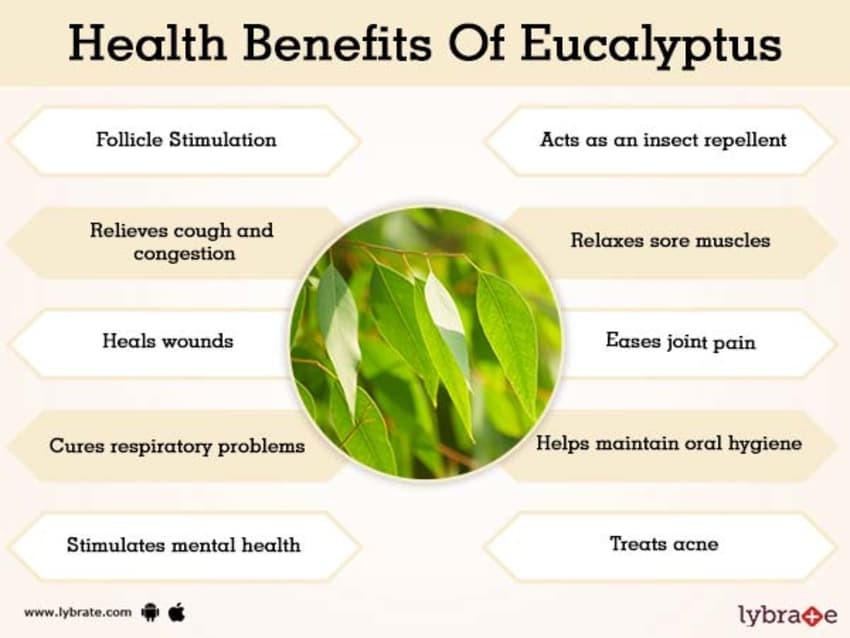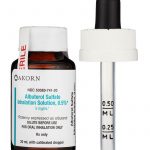
Contents
8 Medicinal Health Benefits of Eucalyptus Leaves
Eucalyptus is a gum tree native to Australia, though it grows in hot, dry places all over the world now. The 8 medicinal health benefits of eucalyptus leaves include pain relief, insect repellent, breath freshness, and more.
Eucalyptus leaves produce volatile oil, used as an ingredient in many over-the-counter medicines. Studies show some benefits, but most are early studies with limited or mixed results.
Eucalyptus is a gum tree native to Australia, though it grows worldwide. Of the approximately 900 varieties, about 300 make volatile oil, also called essential oil, found in the leaves.
Indigenous cultures used eucalyptus leaves in traditional medicine for coughs, colds, bronchitis, fevers, and wound healing. They also used it as an antiseptic to kill germs. In the 1800s, hospitals in England used eucalyptus oil to disinfect catheters.
Today, eucalyptus essential oil is still a natural remedy. While consuming straight eucalyptus oil might be toxic, it is approved by the U.S. Food and Drug Administration (FDA) as a food additive for flavoring.
The Benefits of Eucalyptus
Most eucalyptus leaves are rich in a compound called 1,8-cineole or eucalyptol, which can vary by species. These compounds have medical actions, giving eucalyptus health benefits.
Pain Relief
Eucalyptus oil has a cooling sensation on the skin due to the eucalyptol compound. In lab studies, this compound blocked sensory pathways involved in pain, suggesting it could be a pain reliever. Animal studies also show that eucalyptus oil lowers inflammation, swelling, and pain.
A small human study showed inhaling eucalyptus could lower blood pressure and pain perception in patients undergoing total knee replacement surgery.
Insect Repellent
Ticks are tiny bugs that can spread bacteria and parasites, causing diseases like Rocky Mountain spotted fever or Lyme disease. Lemon eucalyptus oil is one of the few government-approved natural ingredients that can repel ticks. Use a product registered with the Environmental Protection Agency (EPA) for the correct oil concentration.
Breath Freshness
Eucalyptus is a popular ingredient in mouthwashes. The eucalyptol compound is a disinfectant that can kill bacteria causing bad breath. It also provides a fresh, cooling sensation for a bright and clean mouth. A mouthwash combining eucalyptus with menthol might help prevent plaque buildup on teeth.
Soothes Sore Throats
Adding eucalyptus oil or fresh leaves to a throat gargle or spray might soothe a sore throat. A small study tested a throat spray with eucalyptus, peppermint, and other oils on patients with upper respiratory infections. Those using the eucalyptus spray had a significant improvement in sore throat symptoms within 20 minutes.
Helps Headaches
Eucalyptus oil might help ease headache side effects. A small study showed that applying a mixture of eucalyptus and peppermint oil to the forehead and temples relaxed muscles and improved mental performance. Eucalyptus might also cause headaches in some people.
Relieves Coughing
Eucalyptus is a common ingredient in over-the-counter cough syrups, lozenges, and chest rubs. Its eucalyptol compound breaks down mucus, opens up airways, and lowers inflammation. Studies demonstrate its effectiveness in improving cough symptoms from bronchitis or common colds and infections, but more research is necessary.
Relieves Congestion
Eucalyptus oil thins out mucus and makes it easier to cough up, acting as an expectorant. Inhaling eucalyptus steam or using eucalyptus-infused ointments on the chest and nose can help with congestion.
May Lower Blood Pressure
Eucalyptol compounds lowered blood pressure and raised blood nitrite levels in animal studies with chronic nicotine exposure. These early studies suggest that eucalyptol might help control nitric oxide levels and oxidative stress, but further research is needed.
How to Use Eucalyptus
Eucalyptus leaves are less potent than concentrated eucalyptus oil, and both can be used as home remedies for minor issues in different ways.
Inhale Essential Oil
Enjoy aromatherapy by adding eucalyptus essential oil to a diffuser or vaporizer, or inhaling eucalyptus steam to help with coughing and congestion.
Apply Essential Oil Diluted on the Skin
Apply eucalyptus oil to the skin mixed with a carrier oil like jojoba or grapeseed oil to avoid irritation.
Fresh Leaves in the Shower
Tie a bundle of fresh eucalyptus leaves to your shower head. The steam will release the oils, easing your sinuses and providing a fresh aroma.
Safety
Not everyone should use eucalyptus essential oil. Diffuse a few drops around children under two but avoid putting it on or near their faces. Do not give eucalyptus cough drops and syrups to kids under six.
Avoid eucalyptus oil if you have seizures or liver, low blood pressure, or kidney disease or take medications. Consult with your doctor before use, as eucalyptus can worsen some conditions and interact with certain medicines.
Remember that eucalyptus is not medication and cannot replace medical treatment. Always consult your doctor before starting any new treatment or supplements.
QUESTION
BMC Complementary Medicine and Therapies: "Chemical composition of 8 eucalyptus species’ essential oils and the evaluation of their antibacterial, antifungal and antiviral activities."
Carnevale, V., Pagano., Nocella, C. Smoking Prevention and Cessation, "Effects of Smoking on Oxidative Stress and Vascular Function,” IntechOpen, 2018.
Centers for Disease Control and Prevention: "Diseases Transmitted by Ticks," "Preventing Tick Bites."
Cephalgia: "Effect of peppermint and eucalyptus oil preparations on neurophysiological and experimental algesimetric headache parameters."
Cephalgia Reports: "An unsuspected and unrecognized cause of medication overuse headache in a chronic migraineur—essential oil-related medication overuse headache: A case report."
Evidence-Based Complementary and Alternative Medicine: "Effect of Eucalyptus Oil Inhalation on Pain and Inflammatory Responses after Total Knee Replacement: A Randomized Clinical Trial," "Treatment of Upper Respiratory Tract Infections in Primary Care: A Randomized Study Using Aromatic Herbs.”>
Journal of Integrative and Complementary Medicine: "Efficacy and Safety of Eucalyptus for Relieving Cough: A Systematic Review and Meta-Analysis of Randomized Controlled Trials."
Journal of Pharmacy and Pharmacology: "Effects of 1,8-cineole on hypertension induced by chronic exposure to nicotine in rats."
Molecular Pain: "1,8-cineole, a TRPM8 agonist, is a novel natural antagonist of human TRPA1."
Mount Sinai: "Eucalyptus."
Pharmaceuticals: "Essential Oils from Different Plant Parts of Eucalyptus cinerea F. Muell. ex Benth. (Myrtaceae) as a Source of 1,8-Cineole and Their Bioactivities."
University of Minnesota: "How Do I Choose and Use Essential Oils?"
Tisserand Institute: "Are eucalyptus and peppermint oils safe for young children?"
Tisserand Institute: "Are eucalyptus and peppermint oils safe for young children?"


